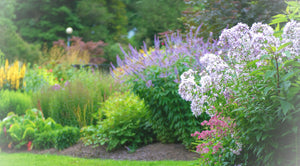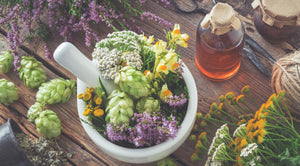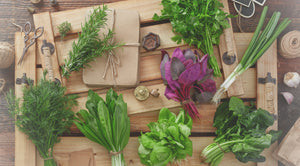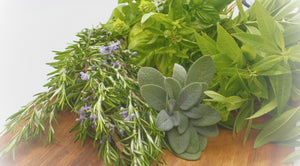Why use organic fertilizers? To begin answering this question, a brief description of healthy soil is necessary. A healthy soil is a teaming environment of microorganisms. These tiny creatures decompose organic material so that it becomes usable food for plants. Organic fertilizers feed these microorganisms as well as plants, thus creating an active biological community in the soil. This is the way nature intended soil to be and results in healthy, vigorous plants.
Chemical fertilizers contain the necessary food for plants, but does not interact with the soil community; it is not available for food for very long. Watering and rain quickly wash chemical fertilizers out of the soil; this is a waste of your money and creates more pollution for our streams, rivers and eventually the Chesapeake Bay. Not only do chemical fertilizers not interact with the soil, in heavy doses, they kill soil microorganisms. This results in more work for the gardener because poor soil must be worked more often.
To grow beautiful flowers and great-tasting vegetables, the gardener must first think about the soil. Strict attention to soil preparation leads to less work and superior plants down the road. Addition of decomposed leaves, manure, and/or peat humus will provide food for the soil’s microorganisms which will, in turn, release food slowly to the plants growing in it. Slow release is the key principle to the success of organic fertilizers.
Only a portion of the nutrients in an application of organic fertilizer are readily available to plants. The remaining portion must be slowly digested by the soil over time, resulting in a slow, steady release of nutrients to plants. As these nutrients are “tied up “ by the soil community, they are not easily washed away by water.
For the average home gardener, organic gardening may sound like a complex, time-consuming process, but it does not have to be. Follow two simple steps: add plenty of organic material to your soil and be selective when buying fertilizer. Adding organic material (humus) is the step which requires a little extra effort, but will reward you with wonderful dividends. Once your soil is well-prepared, the next year’s chores will be a lot easier. You will also find yourself weeding and watering your garden less. So, the next time you decide to feed your plants, rethink your plan, feed your soil and let it feel your plants.
Briscoe White
Chemical fertilizers contain the necessary food for plants, but does not interact with the soil community; it is not available for food for very long. Watering and rain quickly wash chemical fertilizers out of the soil; this is a waste of your money and creates more pollution for our streams, rivers and eventually the Chesapeake Bay. Not only do chemical fertilizers not interact with the soil, in heavy doses, they kill soil microorganisms. This results in more work for the gardener because poor soil must be worked more often.
To grow beautiful flowers and great-tasting vegetables, the gardener must first think about the soil. Strict attention to soil preparation leads to less work and superior plants down the road. Addition of decomposed leaves, manure, and/or peat humus will provide food for the soil’s microorganisms which will, in turn, release food slowly to the plants growing in it. Slow release is the key principle to the success of organic fertilizers.
Only a portion of the nutrients in an application of organic fertilizer are readily available to plants. The remaining portion must be slowly digested by the soil over time, resulting in a slow, steady release of nutrients to plants. As these nutrients are “tied up “ by the soil community, they are not easily washed away by water.
For the average home gardener, organic gardening may sound like a complex, time-consuming process, but it does not have to be. Follow two simple steps: add plenty of organic material to your soil and be selective when buying fertilizer. Adding organic material (humus) is the step which requires a little extra effort, but will reward you with wonderful dividends. Once your soil is well-prepared, the next year’s chores will be a lot easier. You will also find yourself weeding and watering your garden less. So, the next time you decide to feed your plants, rethink your plan, feed your soil and let it feel your plants.
Briscoe White





